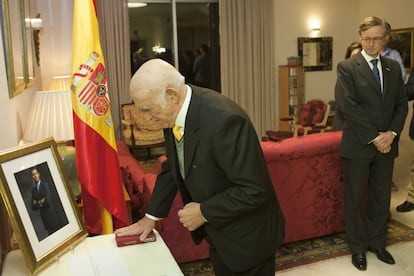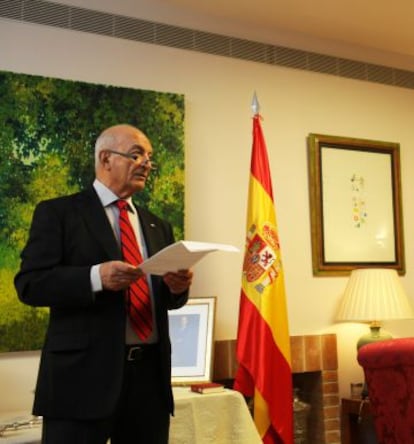Spain at last welcomes back the Sephardim
Following new legislation, the first descendants of expelled Jews get Spanish nationality

Wearing the Order of Isabel the Catholic he received a decade ago, Avner Azulay (Tangiers 1936) swore allegiance to the Spanish King and to its Constitution this week, in a ceremony held on the outskirts of Tel Aviv, and after which he will soon be granted Spanish citizenship. Azulay is a former colonel in the Israeli army and a senior official in Mossad, and was also his country’s intelligence liaison in Spain during the 1970s and 1980s. He led a simple ceremony held in the residence of Spain’s ambassador to Israel, Fernando Carderera, at which another dozen or so Jews of Spanish origin – from North Africa, the former Ottoman empire, and Latin America – symbolized the reunion with the descendants of the Jews expelled from Spain in 1492, known as the Sephardic Diaspora.

“My friends have criticized me for having accepted a decoration that carries the name of a queen who forced our descendants to leave their home or convert to Christianity,” joked Azulay after the ceremony was over. “But I accepted because this symbolizes a new Spain, in the same way that this event symbolizes Sephardic Jews’ reunion with our origins.”
Those who swore allegiance to King Felipe on Tuesday were among the 4,300 Sephardic Jews who have become nationalized Spaniards
He says he had always felt Spanish, and spoke the language with his mother at his childhood home in the Moroccan city of Tangiers. His time in Spain four decades ago, in the early stages of diplomatic relations with the government in Madrid, also marked a move toward his Sephardic origins, he said. At present, he is honorary Spanish consul in the Israeli city of Beersheba in the south of the country.
Standing next to Azulay was Abraham Haim, president of the Council of the Sephardic Community in Jerusalem, who has also recently applied for Spanish citizenship under new legislation approved in October. Those who swore allegiance to King Felipe on Tuesday were among the 4,300 Sephardic Jews who have become nationalized Spaniards, a process that has taken them around two years. The legislation does not require them to renounce their Israeli citizenship or to live in Spain. A 16-year-old boy was the youngest among the group on Tuesday, while the eldest was an 85-year-old man.

Also present at the ceremony in the Spanish ambassador’s residence was José Benarroch, the director of Israeli NGO the World Sephardi Federation. He was brought up in Madrid and studied at the capital’s Complutense University before immigrating to Israel in the early 1960s. His organization works to help Sephardic Jews apply for Spanish nationality. “We have a database that includes thousands of surnames that could help establish the antecedents of a family in Sepharad,” he explains. “There are probably up to half-a-million people around the world who could be considered Sephardim, but it seems that less than 100,000 will end up asking for a Spanish passport.”
The Spanish embassy in Israel has used the occasion of the 30th anniversary of the establishment of diplomatic relations between Spain and Israel to symbolize with this ceremony the reunion with Sepharad with the descendants of Jews expelled from Spain. “On a historical day like this, I recover the words of King Phillip VI to say, ‘We have missed you very much.’ You now return to being Spaniards with a homeland,” said Carderera. Before proposing a toast, he praised the ancestors of the Sephardic community for “having maintained their culture, their language, and their nostalgia for Spain over the course of centuries.”
Tu suscripción se está usando en otro dispositivo
¿Quieres añadir otro usuario a tu suscripción?
Si continúas leyendo en este dispositivo, no se podrá leer en el otro.
FlechaTu suscripción se está usando en otro dispositivo y solo puedes acceder a EL PAÍS desde un dispositivo a la vez.
Si quieres compartir tu cuenta, cambia tu suscripción a la modalidad Premium, así podrás añadir otro usuario. Cada uno accederá con su propia cuenta de email, lo que os permitirá personalizar vuestra experiencia en EL PAÍS.
¿Tienes una suscripción de empresa? Accede aquí para contratar más cuentas.
En el caso de no saber quién está usando tu cuenta, te recomendamos cambiar tu contraseña aquí.
Si decides continuar compartiendo tu cuenta, este mensaje se mostrará en tu dispositivo y en el de la otra persona que está usando tu cuenta de forma indefinida, afectando a tu experiencia de lectura. Puedes consultar aquí los términos y condiciones de la suscripción digital.








































